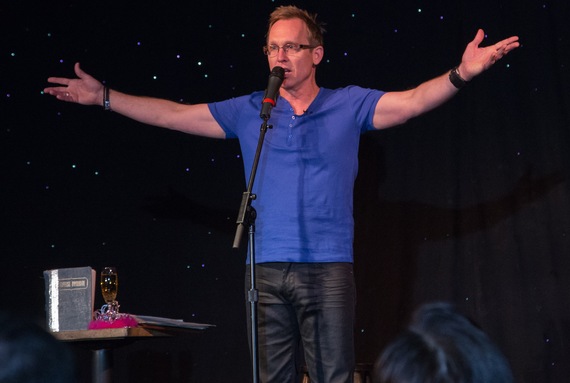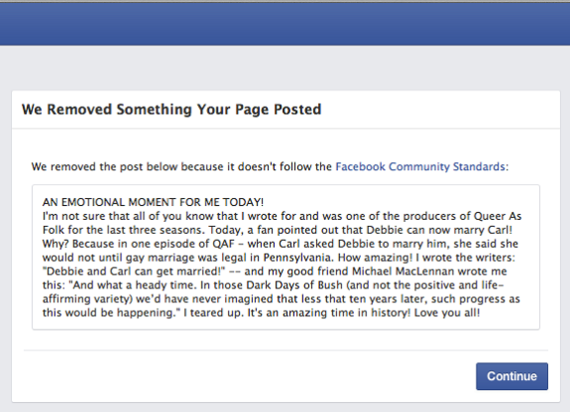Last week, Del Shores, famed writer of Sordid Lives and Southern Baptist Sissies as well as Showtime's groundbreaking Queer as Folk series, was banned for a 30 day term by Facebook based on this post, which they claimed was offensive:
Through another account, Shores was able to post his ban notice, which went viral, prompting a story from Global News and other media outlets. Faced with media scrutiny, Facebook quickly reversed its decision and sought Shores to apologize. A note from Meg Sinclair in Facebook's Corporate Communications department said that the person who reviewed the status update "made a mistake by not understanding the context or tone of your post."
But the apology didn't answer questions about Facebook's customer service, its moderation policies, or how the average user is supposed to get an unfair ban lifted -- a question of special importance to LGBT people, whose most mundane posts can easily be deemed "offensive" to someone.
1. Who decides these things and how?
The ban notice that Shores received from Facebook gave no indication what was specifically deemed offensive about the post, who reported him, or who decided to ban him. In fact, to the general public, little is known about Facebook's moderation process.
In her correspondence with Shores, Sinclair stated: "We review all pieces of content that get reported to us, regardless of who reports it or how many times it gets reported," denying various accusations or assumptions that the process must be automated.
But, given the sheer size of Facebook, it's easy to imagine a virtual ocean of complaints that's almost impossible to manage. In fact, a recent viral blog from someone purporting to be a Facebook moderator paints a picture of a system overwhelmed with petty complaints -- over 250k every hour! The blog post's accuracy cannot be verified but, if the anonymous writer is legit, it's easy to imagine overwhelmed moderators making lots of innocent mistakes.
But it's harder to imagine, absent media scrutiny, how such mistakes ever get reversed.
2. Why does Facebook still not have customer service, even for its paying customers?
Many scams to the contrary, there's still no number you can call for Facebook support or appeals, even if you pay for their services. There is a "click here if you feel you've been unfairly banned" bit of functionality on a Facebook ban notice, and Shores reports that he used it, to no avail. In fact, there's a whole community of previously banned users who will attest that no one ever gets answers directly from Facebook when they are banned, no matter the reason.
Yes, Facebook is a free service, and it may be impossible for them to provide phone support to 100 million users, but Facebook has also managed to monetize our usage in a number of important ways, turning many of us into both audience and advertiser. Our clicks and views get sold, of course, but many users also have occasionally use the "promote this post" feature, or nurture Pages that they promote through paid advertising. When Facebook's moderation mistakes lead to 30-day bans, that can amount to real harm for paying customers, which hurts Facebook. Why hasn't Facebook yet deemed it in its best interest to provide customers with a modicum of customer service?
3. How does one get a Facebook mistake reversed when one is not Del Shores?
Shores is a well-known and outspoken advocate on gay issues and frequent Facebook poster. Because much of his work, like Southern Baptist Sissies, exists in that sometimes-uncomfortable space between religion and sexuality, his very existence on Facebook is offensive to some, which explains why he's been banned three times. Fortunately, he can get media attention when he's unfairly treated. But what about the rest of us?
In his correspondence with Facebook, Shores asked this very question.
I'm a celebrity, so I got press over this and got your attention. In the past, I did not go public and got no response. NONE! Many people who do not have a high profile or my voice and are suspended from their Facebook pages for no good reason, just like I was -- and can get no response! Facebook ignores or does not respond when a complaint is made. Please tell me that you are working on this problem because it is simply not right!
To date, this request has received no response.
Facebook isn't the public square, and there is no Constitutional right to a Facebook account. However, the service is useful only insofar as it allows us to make connections, conduct business, and express our opinions openly. Those of us whose work and very lives are still deemed "offensive" by some need clear procedures and policies for those moments when we are targeted. It's time for some transparency and clarity from Facebook.


